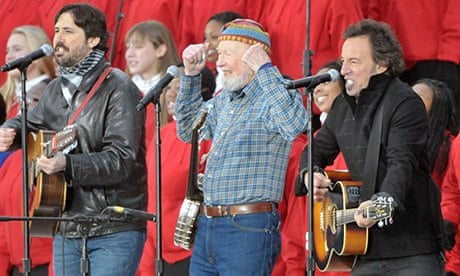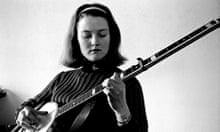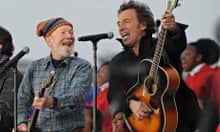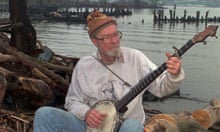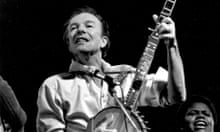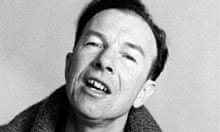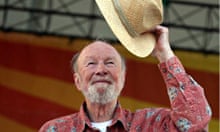Why did Pete Seeger, who has died aged 94, matter? Because for over 75 years he stood true to his original vision, he never wavered. Even when his beliefs had a huge impact on his life and career: he never sold out. He wasn't just a folk singer, or an activist: he was both.
Pete believed that music could make a difference. Not change the world, he never claimed that – he once said that if music could change the world he'd only be making music – but he believed that while music didn't have agency, it did have the power to make a difference.
Shaped by that 30s leftwing mentality of the New Deal, Pete saw songs as political acts – for him these were people's songs – ways for the working class to express themselves. It doesn't matter that this was later superseded by rock and roll and changed beyond recognition – Seeger was there at the beginning and he never stopped.
When you shook his hand you knew you were shaking hands with someone who had crossed America with Woody Guthrie, who had marched with Martin Luther King and who had stared down McCarthyism – he embodied those great struggles. Other artists, like Bruce Springsteen, have recognised that and have seen Seeger as a touchstone, as someone who showed that songs were more than just making records and doing gigs. By choosing his repertoire carefully, Seeger brought the work of artists who had never achieved great success in their lifetimes to a mainstream audience. In the 1950s he put songs by Leadbelly and Woody Guthrie into the charts and royalties into the hands of their families.
He was already old the first time I met him – we were at a Canadian folk festival, where – as well as doing my own spot – I was invited to take part in a workshop where various artists played songs together. I agreed to take part in a Woody Guthrie workshop and when I turned up I saw that I was set to play with Ramblin' Jack Elliott – Woody's right-hand man – Arlo Guthrie and Seeger. I thought: I'm completely busted here. I busked it and at the end Seeger stood up and in his reedy voice he started to sing This Land is Your Land. Guthrie and Elliot did a verse, but when it came to my turn I had to say sorry folks – that land was not my land – we just don't learn this song in England. Seeger was so supportive and understanding.
Another time, when I was with Seeger and Arlo Guthrie again, this time to see Woody Guthrie inducted into the Rock and Roll Hall of Fame, Seeger – who must have been in his 70s – disappeared. When I turned around he was lying on his back, elbows under his hips, cycling his legs in the air. He was just something else.
Seeger was criticised as a Stalin apologist, but he was honest about it and regretted his own naiveté. Like many at that time, he saw that the idealism that seemed to manifest itself in the USSR had been totally undermined by totalitarianism. He wasn't afraid to admit he had been wrong, and – despite the insults people threw at him – he was a patriot. He believed in America and liberty – but not just in the liberty to make money, his idea of freedom was broader than that.
He was also criticised for turning against his protege Bob Dylan, but I think that was misunderstood. Yes, he did try to get Dylan to turn down his amplifier at Newport in 65. But the thing that angered Seeger was not the fact that Dylan had gone electric – he'd applauded Muddy Waters electric set earlier that day – he was angry because he couldn't hear the lyrics. The words, the context, was everything. Seeger, who had faced a spell in prison because of the words he sang, had more reason to be angry than most.
Is anyone carrying the light, continuing the tradition? Arguably Springsteen, or artists like Tom Morello who does solo shows wearing caps with the IWW [Industrial Workers of the World] logo and playing only political songs. But it is hard to find someone who has been around for so long, fought so many causes and seen so many things. I will miss him. I will miss him because every time I shook his hand, I knew I was shaking hands with history.
